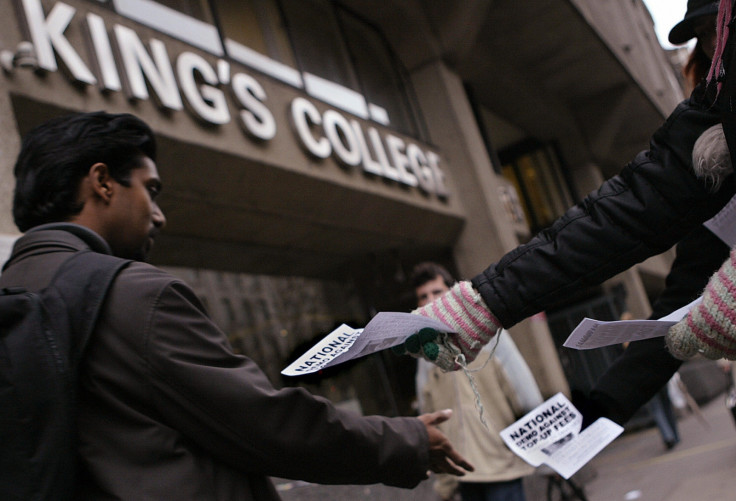Spying on campus: King's College student emails 'monitored' under UK anti-terror law
University's computers hit with 'monitoring' warning under controversial 'Prevent' scheme.

Under an anti-terror law enforced by the UK government, students at King's College London (KCL) have been told their email activity on campus computer systems is "monitored and recorded" as part of a scheme to help prevent radicalisation.
Critics of the law – including the National Union of Students (NUS) and University and College Union (UCU) – maintain it does little but stymie academic freedom, however the university has said there's nothing to worry about: the process is standard practice.
A memo placed on KCL's email login portal was updated last week to state individuals on the system are "subject to having all of their activities on this system monitored and recorded".
It continued: "King's has a statutory duty under the Counter Terrorism and Security Act 2015, termed Prevent. The purpose of this duty is to aid the process of preventing people being drawn into terrorism.
"You must not create, download, store or transmit unlawful material or material that is indecent, offensive, defamatory, threatening, discriminatory or extremist. The university reserves the right to block or monitor access to such material.
"Anyone using this system expressly consents to such monitoring and is advised that if such monitoring reveals possible evidence of criminal activity or activity contrary to [Prevent] system personnel may provide the evidence of such monitoring to law enforcement officials."
The Prevent agenda is one of four strands that make up the UK government's ongoing counter-terrorism effort. First established in 2011, it "aims to stop people becoming terrorists or supporting terrorism".
The other three areas are Pursue, Protect and Prepare. While the entire list of organisations it impacts remains unclear, the agenda works with a "wide range of sectors" including education, criminal justice, faith, charity work, technology and healthcare.
A spokesperson for KCL said: "The changes to text on the sign-in screen indicate our obligations under Prevent with regards to such policy.
"We are following best practice for the sector as advised by UCISA [Universities and Colleges Information Systems Association] and defined by law, which determines what is and is not permissible use of institutional IT facilities.
"King's College London is proud of its diverse and inclusive community and any monitoring would form part of the usual security process."
The Higher Education Funding Council for England (HEFCE), the body which enforces the roll-out of Prevent in education facilities, said: "The university make it clear to users of their systems what is and isn't acceptable usage and how they identify cases where those rules aren't adhered to.
"This approach is consistent with the Prevent guidance. Within this guidance, providers have had the autonomy to decide what approach works for them. Some have gone down the route of filtering, some monitoring and some neither of these."
But the president of the National Union of Students (NUS), Malia Bouattia, slammed the email notice as "yet another example of how the Prevent agenda turns our educational institutions against their own students".

Bouattia said the legislation only "perpetuates a culture of fear, restricts academic freedoms and normalises Islamophobia".
In a statement, she added: "[The] NUS is deeply concerned about the impact that systematic monitoring of messages will have on students, particularly black and Muslim students and those involved in political campaigns, activities or research."
One King's College student, Ibtehal Hussain, who spoke to the Middle East Eye, said the knowledge that emails were being retained and monitored only created a "climate of fear and intimidation" for those involved in political activism.
That stance echoes the position of the University and College Union (UCU) which, in December 2015, said Prevent threatened "academic freedom and freedom of speech" and claimed that "the broad definition of terrorism will stifle campus activism".
It asserted: "The [law] will force our members to spy on our learners, is discriminatory towards Muslims, and legitimises Islamophobia and xenophobia, encouraging racist views to be publicised and normalised within society – the monitoring of Muslim students will destroy the trust needed for a safe and supportive learning environment."
In April last year, as reported by The Guardian, the Prevent agenda was criticised by Maina Kiai, the United Nation's special rapporteur on the right to freedom of assembly.
He said: "The spectre of Big Brother is so large, in fact, that I was informed that some families are afraid of discussing the negative effects of terrorism in their own homes, fearing their children would talk about it at school and have their intentions misconstrued.
"By dividing, stigmatising and alienating segments of the population, Prevent could end up promoting extremism, rather than countering it."
© Copyright IBTimes 2025. All rights reserved.





















